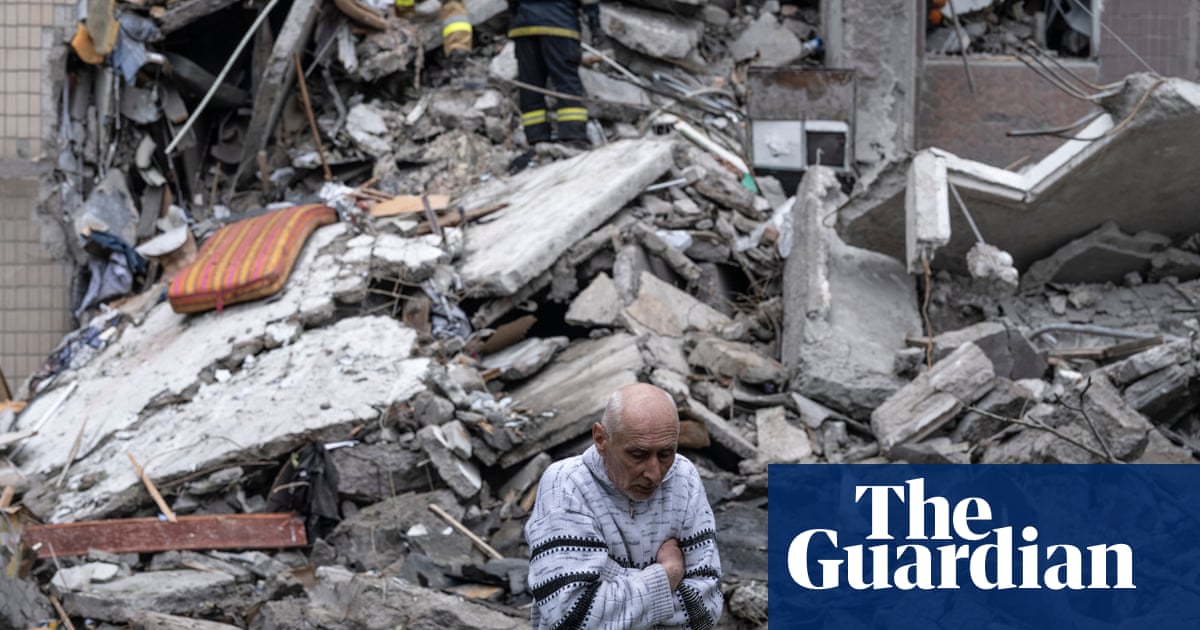Ukrainian officials believe a largely stalemated war of attrition withRussiais likely to continue for several more years, despite international efforts pushed by Donald Trump to end the fighting.
After the inconclusive breakup of the first direct talks between Kyiv and Moscow in Istanbul on Friday, and despite the US president’s planned calls with Russia’s Vladimir Putin and Ukraine’s Volodymyr Zelenskyy, they see no evidence that Moscow is serious about peace.
The comments came as Russia launched its largest drone attack of the war, with 273 aimed largely against the central Kyiv region and the Dnipropetrovsk and Donetsk regions in the country’s east.
“The Russians can’t destroy us and we can’t liberate territory,” one senior Ukrainian official told the Guardian, adding that without significant US assistance that situation was likely to remain and potentially worsen. “Without the US it is impossible to change the balance. [And over time] it will push the balance to Russia. We will still be alive but we will pay a huge price.”
The remarks follow a week in which senior Russian officials have been explicit about the Kremlin’s appetite for pursuing a long war and making maximalist demands in return for peace. These extend to Ukraine removing its forces from five regions, including areas not occupied by Russian forces.
During the brief Istanbul talks, the Russian negotiator Vladimir Medinsky said his country was prepared to continue fighting: “We don’t want war, but we’re ready to fight for one, two, three years, however long it takes. We fought Sweden for 21 years. How long are you ready to fight?”
While some Ukrainian officials believe there may be more room for flexibility if future negotiations do take place, on the most fundamental issues Ukraine and Moscow are as far away as ever.
“There are a handful of real issues around independence and sovereignty and economic and security ties with westernEurope,” said the senior official.
“On the other things, well, the size of [Ukraine’s] army will be constrained by economic reasons. Neutrality [demanded by Russia] is a question of framing. But we can’t agree to cancel ties with the west.”
The reality, as some Ukrainian politicians are saying publicly, is that the choreography of the current negotiations is as much about Kyiv – and Zelenskyy in particular – working at every move to keep a lukewarmTrump administrationon side in the hope that the US president experiences an epiphany over the nature of Putin’s war aims.
“[Zelenskyy] is in a difficult situation because behind him is a whole nation of people who are suffering,” Oleksandr Merezhko, a politician in Zelenskyy’s party, said recently.
“We are playing [along], we are trying to do everything we can because we don’t want to lose the support of the US. We don’t want to be accused that it was our fault.”
Another issue that militates against a halt to the fighting is the possibility that Putin recognises that restarting a war – after a long ceasefire – would be more challenging than continuing with the current conflict.
For Hanna Maliar, a lawyer and former deputy defence minister, one of the key difficulties facing meaningful negotiations is the very different way Trump and Putin view the process, including the latter’s ideological investment in the mythology of the war he has prosecuted.
She said: “He will continue trying to move forward. He has the power. He has forces to continue to fight. His goal is to occupy the territory of Ukraine. And he is reaching for this goal.”
And in terms of negotiations, she said Putin and Trump “represent totally different cultures”.
“Putin is a former KGB agent. He will never step down and he thinks like an aggressor,” she said. “Trump thinks that this is like a business negotiation that somehow will benefit everyone. But even if they sit at table they will never reach a common agreement because Putin is thinking in only one direction: war, rockets and missiles.”
All of this has convinced Maliar – in common with many others in Ukraine – that the most likely outcome is prolonged hostilities. “If you ask the chances, I would say there is a 90% chance this war continues for another one to two years. Not least because since Trump became president the intensity of the combat has increased,” she said.
The danger, as many are aware, is that in a prolonged grinding war of attrition and with significantly less resources than Russia, Ukraine – without increased support from the US and Europe – faces a long-term risk.
“A war of attrition is like a plateau with a drop at the end of it,” said the senior official. “That drop-off is a collapse of the frontlines.
“You can’t say when it will happen. But you need to push into the future. To prevent that we need to rationalise our war efforts, to become more effective.”
For some in Ukraine, a best-case scenario out of the current negotiations might be a ceasefire that freezes the war along the frontlines without necessarily resolving the issues. While some argue that will inevitably benefit Russia in preparing for a future return to hostilities, others argue that Ukraine could also benefit from a long pause that allows it to reorganise its armed forces, step up weapons production and strengthen frontline fortifications.
“It is a huge miracle that we are chatting now after three years and two months of war,” added the official. “In the meantime I believe Russia will help us by doing by something stupid.”
